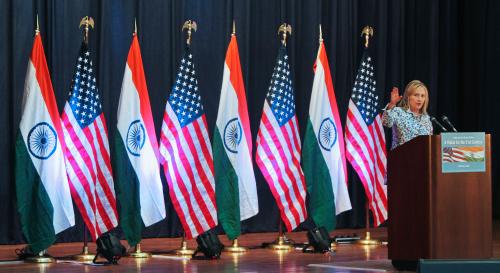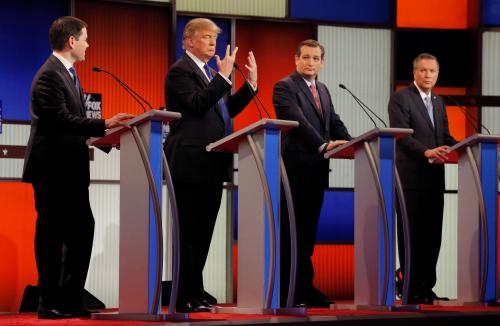When she gives her speech tonight at the Democratic National Convention, Hillary Clinton will of course be at a crucial point in her campaign for the presidency. Her fellow Democrats—including her running mate Senator Tim Kaine, as well as Michael Bloomberg—have roundly criticized her Republican opponent Donald Trump this week. Vice President Biden and President Obama usefully offered a counterpoint to the dark worldview we saw from Mr. Trump last week in Cleveland. And former President Bill Clinton, as well as first lady Michelle Obama, told us about Clinton’s longstanding dedication to women and children, the less fortunate, and the nation as a whole. As a parent of a child on the autism spectrum, I have seen and deeply appreciated this side of Clinton myself.
Now, it is up to Clinton to sketch out a positive vision for her own presidency. In so doing, she must strike a balanced tone—acknowledging and tapping the energy (and at times anger) of Bernie Sanders, Elizabeth Warren, and their wing of the Democratic Party—while also reaching out to independents and moderate Republicans to whom she should appeal (given her past and her politics, and most of all, her opponent), but who at present tend not to think favorably of her.
Against this complex backdrop, I would offer only a few suggestions for her upcoming speech:
-
- On the state of the world, we need a nuanced view. Yes, there are big problems. Yes, ISIS is a greater threat than President Obama has sometimes acknowledged. On balance, however, things are troubled but not bad. Democracy has taken a hit in recent years, and the world’s economy has struggled in many ways for a decade, and Russia and China have caused considerable problems of late. But taking a larger perspective, the international order still has many strong points. Our alliances are strong. Despite recent setbacks, a higher percentage of people around the world live in democratic countries and above the poverty line this century than ever before. Child mortality globally is way down. U.S.-India relations are better than ever, as are America’s ties to other key rising powers like Indonesia. The U.S. military is indeed very strong (as retired General David Petraeus and I write in a forthcoming Foreign Affairs article), even if there is much to do to make it even better.
-
- We do need to do better in fighting ISIS. Ideas on how to attack it in Syria and Libya, among other places, will be key, even if details will necessarily need to await 2017. And while I think President Obama has done better in dealing with Russia and China than commonly understood, Obama has not explained his strategies for handling these powers very well to the United States. Clinton can help.
-
- The fading middle-class economic dream in the United States remains the central issue of this campaign. It explains the rise of Sanders and Trump better than any other single factor or phenomenon. Clinton’s views on economics are good but they come across as a bit piecemeal, borrowing from Sanders on a few key points like the minimum wage and trade but somewhat lacking her own key stamp. Above all other issues, I hope she concentrates on this tonight.
-
- We have not heard much about Benghazi or about Clinton’s email problems this week. To be sure, many Republicans have inflated these issues beyond all reason. But Clinton should still apologize for her mistakes to the country, without overdoing it. As best I can tell, she put no true national secrets or American personnel at risk in her emails, and while Benghazi was a tragedy that might have been preventable, no one can be perfect in times like these. We don’t typically excoriate our military commanders for mistakes that tragically may cost American lives in a given tactical operation, recognizing that such setbacks happen in war. That is not to excuse the lack of proper attention to Libya and Benghazi by the U.S. government back in 2011 and 2012, only to put it in perspective.
-
- It would be good to hear some nice words about Republicans too, in an effort to reach across the aisle and defuse some of the anger in American politics today. I don’t mean just to compliment Lincoln and Teddy Roosevelt, but also to note the importance of people like Pete Domenici and Warren Rudman in fiscal policy and deficit reduction (and more recently, John Boehner and Paul Ryan); George H.W. Bush and Bob Dole in the Americans with Disabilities Act; the Republican Congress of the 1990s in welfare reform; George H.W. Bush again as well as people like Christie Todd Whitman in environmental policy; George W. Bush on PEPFAR/AIDS and also on stressing inclusivity while avoiding anti-Muslim rhetoric after the 9/11 attacks; and good GOP governors or former governors like Mitch Daniels, John Kasich, and Jeb Bush in fostering economic growth as well as education reform across much of the country. To Democrats angry with the current Republican presidential ticket, as well as much of the current congressional leadership, this may seem like bending over backwards to appease the opposition. But in fact, the above folks are not the opposition that Clinton needs to defeat now; they are responsible, constructive, patriotic members of the other main political party in the United States. They are not the enemy, and by reaching out to them, Clinton can improve her odds of beating the person who is now very much the adversary—not only of the Democratic ticket, but of much of this country’s finest bipartisan traditions and accomplishments.
I’ll be rooting for all the above (and also hoping to get to bed before midnight). Please bring it on, Hillary!







Commentary
What Clinton should say in her DNC speech tonight
July 28, 2016